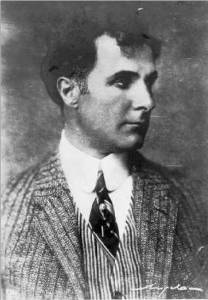Alfréd Deésy
Alfréd Deésy (born September 22, 1877 in Dés , Austria-Hungary , † July 18, 1961 in Budapest , Hungary ) was a Hungarian film director , screenwriter and film actor who directed 82 films between 1913 and 1960 , appeared in 30 films and wrote the script for 8 films .
Life
Deésy was born in 1877 in the then Austro-Hungarian county capital Dés (today Dej, Romania ), his stage name means "from Dés". In the first half of the 20th century he made a name for himself as a prominent actor on the Hungarian set . Already in his early years he became interested in film images and in 1911 he became co-manager at the Apollo film theater in Debrecen . In the following year Deésy created film scenes for growing film production companies and wrote his first screenplay himself in 1913. He began his directing career in 1914 with the film Az attak , produced by Star-film , a Hungarian film production company which he later ran until 1919, when the Hungarian film industry was nationalized during the communist revolution.
When the revolution was crushed and Hungary fell under military rule, Deésy was hired as a director and screenwriter at Egyetértés , a film production company that he soon took over. In 1926 he moved to Vienna and produced Sacco and Vanzetti (1927), an extremely controversial film that was banned in many European countries, including Hungary. Deésy returned to Hungary in 1931 and produced his best-known film Nem élhetek muzsikaszó nélkül (1936, English: I Can't Live Without Music ) in 1935 . During the Hungarian collaboration with the Axis Powers , Deésy continued his work as a director, including the infamous anti-Soviet film Üzenet a Volgapartról (1942). After his last success as a director with the film Fél pár gyűrött kesztyű (1947), he returned to acting as an actor until a few months before his death in 1961.
Work and cinematic legacy
Alfréd Deésy was one of the most important figures in the Hungarian film industry. He specialized in simple entertainment with melodramas, adventure films, romances and also musicals. However, his beginnings in film production were rather unconventional, and this was reflected in the work of other directors whose talents he sought to nurture. Star-film was one of the greatest promoters of talent during the silent film era. It was here that Bela Lugosi made his acting debut in Deésys films, and Michael Curtiz produced his first films here.
As a director who mainly dealt with silent films, Deésy is little known or preserved. According to the Magyar Nemzeti Filmarchívum , the Hungarian National Film Archive , around 85% of Hungarian silent films have been lost. Nem élhetek muzsikaszó nélkül was long considered a classic in Hungary, and only a few of his silent films such as Á Leányasszony (1918) are still available or, like Casanova (1918), have survived in fragments.
Filmography (selection)
- 1913: Rablélek
- 1916: A magyar föld ereje
- 1916: A Karthausi
- 1917: Nászdal
- 1917: A Régiséggyüjtö
- 1917: Leon Leoni (Leoni Leó)
- 1917: The Sea Monster (A Tryton)
- 1917: The masked ball (Álarcosbál)
- 1917: Dorian Gray (Az élet király)
- 1918: Casanova
- 1918: the leopard
- 1918: Küzdelem a létért
- 1927: In the shadow of the electric chair
- 1927: Sacco and Vanzetti
- 1935: Nem élhetek muzsikaszó nélkül
- 1960: the fall of young Noszty
literature
- Alfréd Deésy pm: Porondon, deszkán, mozivásznon . Budapest 1992, ISBN 963-7602-81-X .
Web links
- Alfréd Deésy in the Internet Movie Database (English)
- Deésy Alfréd: Leányasszony. Filmkultúra, accessed August 21, 2017 .
Individual evidence
- ↑ Arthur Lennig: The Immortal Count. The Life and Films of Bela Lugosi . Lexington 2003, ISBN 0-8131-4376-4 .
- ^ Gary D. Rhodes: Lugosi. His Life in Films, on Stage, and in the Hearts of Horror Lovers . McFarland, Jefferson 1997, ISBN 0-7864-0257-1 , pp. 3 ff .
| personal data | |
|---|---|
| SURNAME | Deésy, Alfréd |
| ALTERNATIVE NAMES | Désy Alfréd; Kempf-Dezsi, Alfred; Fight, Alfred |
| BRIEF DESCRIPTION | Hungarian film director and actor |
| DATE OF BIRTH | September 22, 1877 |
| PLACE OF BIRTH | Dés , Austria-Hungary |
| DATE OF DEATH | July 18, 1961 |
| Place of death | Budapest , Hungary |

